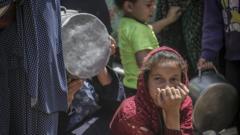The situation in Gaza grows increasingly dire as the head of the UN refugee agency labels the denial of food as a "weapon of war." Philippe Lazzarini's statements emphasize the overwhelming struggles faced by civilians amid ongoing military actions and an unyielding blockade that has restricted critical humanitarian aid.
In recent comments, Lazzarini described the current conditions in Gaza, stating, "Starvation is spreading, people are exhausted, people are hungry... we can expect that in the coming weeks if no aid is coming in, people will not die because of bombardment, but they will die because of the lack of food." This assertion highlights the catastrophic impact of the blockade, which has left the Gaza Strip teetering on the edge of famine. According to reports from the Integrated Food Security Phase Classification (IPC), more than two million Gazans, nearly half of whom are children, are experiencing acute food insecurity, with 470,000 classified as being in a "Phase 5 – catastrophe" situation.
The situation escalated further after Israel resumed military operations on March 18, breaking a ceasefire that had persisted for two months. Prime Minister Benjamin Netanyahu’s government has faced increasing pressure from nationalists to intensify offensive actions, with promises of more vigorous military campaigns looming in the aftermath of prominent political visits, including one from President Donald Trump.
The humanitarian crisis reflects a broader geopolitical struggle, as officials like Lazzarini accuse Israel of using food access as a leverage tool against Hamas. "This is a war crime," Lazzarini stated, reinforcing the perception that the blockade amounts to genocide. Critics both domestic and international express alarm at the deteriorating conditions in Gaza, as families are forced to flee and countless are left vulnerable to starvation.
Israel's defense ministry has openly declared that denying humanitarian aid serves as a tactical approach against Hamas, illustrating the cold calculus of war that prioritizes political and military objectives over the wellbeing of civilians. The fallout from these developments has ignited mass protests among reservists in the Israeli military, who voice concerns that they are fighting for the government's survival rather than security.
As international voices grow louder against the backdrop of this crisis, the discussions surrounding war crimes and potential accountability through bodies like the International Criminal Court gain prominence. Lazzarini, amidst escalating humanitarian challenges, warns against indifference from the international community, calling for urgent action before the ongoing atrocities in Gaza become irreparable.
Consequently, while geopolitical ambitions and narratives clash, the immediate plight of Gaza's civilians, grappling with the specter of starvation and chaos, remains a pressing humanitarian crisis demanding global attention and compassion.




















